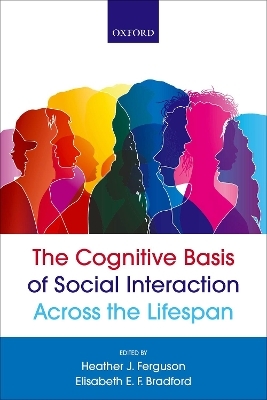
The Cognitive Basis of Social Interaction Across the Lifespan
Oxford University Press (Verlag)
978-0-19-884329-0 (ISBN)
Social interaction is an important aspect of everyday life and its success (or lack of) impacts heavily on our wellbeing. A vital part of successful social interaction is the ability to understand and predict events in terms of other people's mental states, such as their intentions, beliefs, emotions, and desires (termed Theory of Mind, ToM). Children typically develop the necessary skills for social interaction around four years old, and as healthy adults, we engage in social interaction frequently and seemingly without a great deal of difficulty.
This book explores how human social interactive abilities change across the lifespan, looking at infancy, early and middle childhood, adolescence and young adulthood, adulthood, and older age, as well as healthy and atypical development. Over nine chapters, leading researchers in the field provide an overview of the most recent findings, contribute to key debates on social phenomena (including their underlying mechanisms, environmental triggers, and neural basis), and outline innovative avenues for future directions.
Written in an accessible style, this book will appeal to a wide range of readers including academics and students of psychology, neuroscience, psychiatry, linguistics, and philosophy, as well as providing valuable insights for clinicians and practitioners working in the fields of social care, mental health, and education.
Heather J. Ferguson is a Professor in Psychology at the University of Kent. She completed her PhD in Cognitive Neuroscience and Psycholinguistics at the University of Glasgow in 2007, followed by a two-year postdoctoral research position at UCL. Her research examines the cognitive basis of social communication. Professor Ferguson examines the time-course of integration, the underlying neural mechanisms, and the extent to which constraints from world knowledge and context compete to influence social interaction and pragmatic language comprehension. This work has received generous funding, including a European Research Council grant examining social communication across the lifespan, and Leverhulme Trust grants that link social processing to language (including in autism spectrum disorders). She has been recognized through multiple prizes (e.g. Psychonomic Early Career Award 2019), and holds key leadership positions in the discipline (e.g. Honorary Secretary to the Experimental Psychology Society). Elisabeth E.F. Bradford is a Lecturer in Cognitive and Developmental Psychology at the School of Social Sciences, University of Dundee (Scotland, U.K.). She completed her PhD at the University of St Andrews in 2016. Prior to her lectureship at the University of Dundee, Lizzie worked as a Postdoctoral Research Associate at the University of Kent (England, U.K.). Her research focuses on social cognition abilities, examining how these capacities change and develop across the lifespan, the impacts of deficits in social cognition abilities, how social cognition may vary across cultures, and factors that may underlie successful engagement of social cognition abilities at different ages (e.g., executive functions).
1: Heather J. Ferguson: The Cognitive Basis of Social Interaction Across the Lifespan: An Introduction
2: Tobias Schuwerk and Hannes Rakoczy: Social Interaction in Infancy
3: Serena Lecce and Rory T. Devine: Social Interaction in Early and Middle Childhood: The Role of Theory Of Mind
4: Sarah Donaldson and Kathryn Mills: Development of Social Cognition in Adolescence and The Importance of Mating
5: Ian A. Apperly and J. Jessica Wang: Mindreading in Adults: Cognitive Basis, Motivation, and Individual Differences
6: Victoria E. A. Brunsdon, Elisabeth E. F. Bradford, and Heather J. Ferguson: Social Interactions in Old Age
7: Lucy Anne Livingston and Francesca Happé: Understanding Atypical Social Behaviour Using Social Cognitive Theory: Lessons from Autism
8: Muireann Irish and Siddharth Ramanan: The Ageing Brain in Context: Towards a Refined Understanding of Social Cognition in Ageing and Dementia
9: Elisabeth E.F. Bradford, Martina De Lillo, and Heather J. Ferguson: The Future of Research on Social Interaction
| Erscheinungsdatum | 01.09.2021 |
|---|---|
| Verlagsort | Oxford |
| Sprache | englisch |
| Maße | 158 x 235 mm |
| Gewicht | 398 g |
| Themenwelt | Geisteswissenschaften ► Psychologie ► Entwicklungspsychologie |
| Geisteswissenschaften ► Psychologie ► Sozialpsychologie | |
| Sozialwissenschaften ► Soziologie | |
| ISBN-10 | 0-19-884329-1 / 0198843291 |
| ISBN-13 | 978-0-19-884329-0 / 9780198843290 |
| Zustand | Neuware |
| Informationen gemäß Produktsicherheitsverordnung (GPSR) | |
| Haben Sie eine Frage zum Produkt? |
aus dem Bereich


